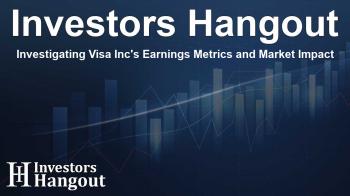Investigating Visa Inc's Earnings Metrics and Market Impact

Analyzing Visa Inc's Stock Performance
In today’s market sessions, Visa Inc. (NYSE: V) shares are currently priced at $354.38, reflecting a slight decline of 0.05%. Despite a 5.16% dip over the last month, the stock has impressively surged by 34.85% over the past year. Such contrasting short-term and long-term performances draw attention to the critical evaluation of the company's price-to-earnings (P/E) ratio amongst investors.
Understanding the Importance of the P/E Ratio
The P/E ratio serves as a vital tool for long-term investors, allowing them to gauge a company's market standing against historical earnings and overall market trends. A lower P/E may imply that the market does not foresee significant future growth, or conversely, that the stock is potentially undervalued.
Visa's P/E Ratio Compared to Industry Standards
Currently, Visa boasts a P/E ratio of 35.63, which exceeds the average P/E ratio of 35.19 for the broader Financial Services sector. This might signal a belief in Visa’s superior performance expectations compared to its industry peers; however, there are concerns that the stock might be overvalued.
Limitations of the P/E Ratio
While the P/E ratio is a significant indicator of a company's valuation, it is crucial to acknowledge its limitations. A lower P/E indicates potential undervaluation but could simultaneously suggest that shareholders are skeptical about upcoming growth opportunities. Hence, analyzing this ratio should be done alongside other financial metrics and situational analyses.
Broader Investment Considerations
Investors should remain attentive to market dynamics and external factors that might influence Visa’s stock price. Trends within the payments industry, economic fluctuations, and technological advancements are all critical elements that could impact Visa’s share value moving forward.
Making Informed Investment Decisions
In conclusion, while the P/E ratio provides useful insights for evaluating Visa Inc’s market performance, a comprehensive investment strategy should incorporate various financial indicators and qualitative assessments of the company's position within the finance ecosystem. By employing a more holistic approach, investors can craft better-informed investment decisions.
Frequently Asked Questions
What is the current stock price of Visa Inc?
The current stock price of Visa Inc. is approximately $354.38.
What does the P/E ratio signify?
The P/E ratio is a measure that reflects the market's expectations regarding a company's future earnings growth compared to its current earnings.
How does Visa's P/E ratio compare to its industry?
Visa's P/E ratio of 35.63 is higher than the Financial Services industry's average P/E of 35.19.
Why is the P/E ratio important for investors?
The P/E ratio helps investors determine whether a stock is overvalued, undervalued, or fairly priced based on its earnings performance.
What should investors consider alongside the P/E ratio?
Investors should also consider industry trends, economic conditions, and qualitative factors about the firm's operations to make well-rounded investment decisions.
About The Author
Contact Henry Turner privately here. Or send an email with ATTN: Henry Turner as the subject to contact@investorshangout.com.
About Investors Hangout
Investors Hangout is a leading online stock forum for financial discussion and learning, offering a wide range of free tools and resources. It draws in traders of all levels, who exchange market knowledge, investigate trading tactics, and keep an eye on industry developments in real time. Featuring financial articles, stock message boards, quotes, charts, company profiles, and live news updates. Through cooperative learning and a wealth of informational resources, it helps users from novices creating their first portfolios to experts honing their techniques. Join Investors Hangout today: https://investorshangout.com/
The content of this article is based on factual, publicly available information and does not represent legal, financial, or investment advice. Investors Hangout does not offer financial advice, and the author is not a licensed financial advisor. Consult a qualified advisor before making any financial or investment decisions based on this article. This article should not be considered advice to purchase, sell, or hold any securities or other investments. If any of the material provided here is inaccurate, please contact us for corrections.

